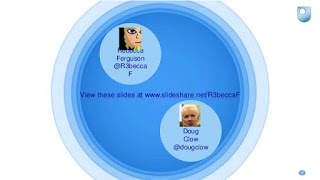With a focus on why people act/engage the way they do in
MOOCs, when looking at different size MOOCs (size being the number of weeks the
mooc is running). Rebecca Ferguson and Doug Clow from the OU on stage, first
Rebecca, then Doug.
Different engagement patterns depending on assessments that are in the MOOC or not, the same with discussions that might be in it or not. Which makes it a difficult exersize to find patterns that can be compared.
Abstract
Massive open online courses (MOOCs) are part of the lifelong
learning experience of people worldwide. Many of these learners participate
fully. However, the high levels of dropout on most of these courses are a cause
for concern. Previous studies have suggested that there are patterns of
engagement within MOOCs that vary according to the pedagogy employed. The
current paper builds on this work and examines MOOCs from different providers
that have been offered on the FutureLearn platform. A cluster analysis of these
MOOCs shows that engagement patterns are related to pedagogy and course
duration. Learners did not work through a three-week MOOC in the same ways that
learners work through the first three weeks of an eight-week MOOC.
Life-changing learning is put on one of the slides (just side remark)
This research was a reaction to first findings from Coursera
research on clusters of completers, lurkers… BUT, they were keen to see what
happens in FutureLearn courses. Interested in increasing engagement,
satisfaction in MOOCs as felt by learners.
The approach of this talk was not to focus on details, but
that is all in the paper. So they switched to focus on ‘how generasible is the
research in MOOCs’, and then only focus on one strand of research. Both slides
are u on slideshare.
What do we – all of us – understand when thinking about
generalising about MOOCs. So what do we think about what a MOOC is.
Only about 8% has engaged in multiple platform MOOCs, while
50% has completed a MOOC, and about 95% of people in the room has been looking
into a MOOC (not completed, with completion being a very personal
interpretation).
Doug Clow: patterns of engagement in the middle are quite variable in MOOCs.
Quiet participants, contributors, and consistent engagers are the clusters of engagement chosen by Rebecca and Doug.
In FutureLearn the decision was made to add discussion to every piece of content, as their focus is on discussion, or dialogue between participants.
Pedagogical choices inevitably result in different results, in different behaviors, which infiltrates clusters made as well... so that is the difficulty of focusing on one MOOC, and trying to scale to other MOOCs.
Similar when teaching a class, even if the content and approach are identical, the class dynamic will make it into a different course, simply by the interventions from the learners.
Quiet participants, contributors, and consistent engagers are the clusters of engagement chosen by Rebecca and Doug.
In FutureLearn the decision was made to add discussion to every piece of content, as their focus is on discussion, or dialogue between participants.
Pedagogical choices inevitably result in different results, in different behaviors, which infiltrates clusters made as well... so that is the difficulty of focusing on one MOOC, and trying to scale to other MOOCs.
Similar when teaching a class, even if the content and approach are identical, the class dynamic will make it into a different course, simply by the interventions from the learners.
